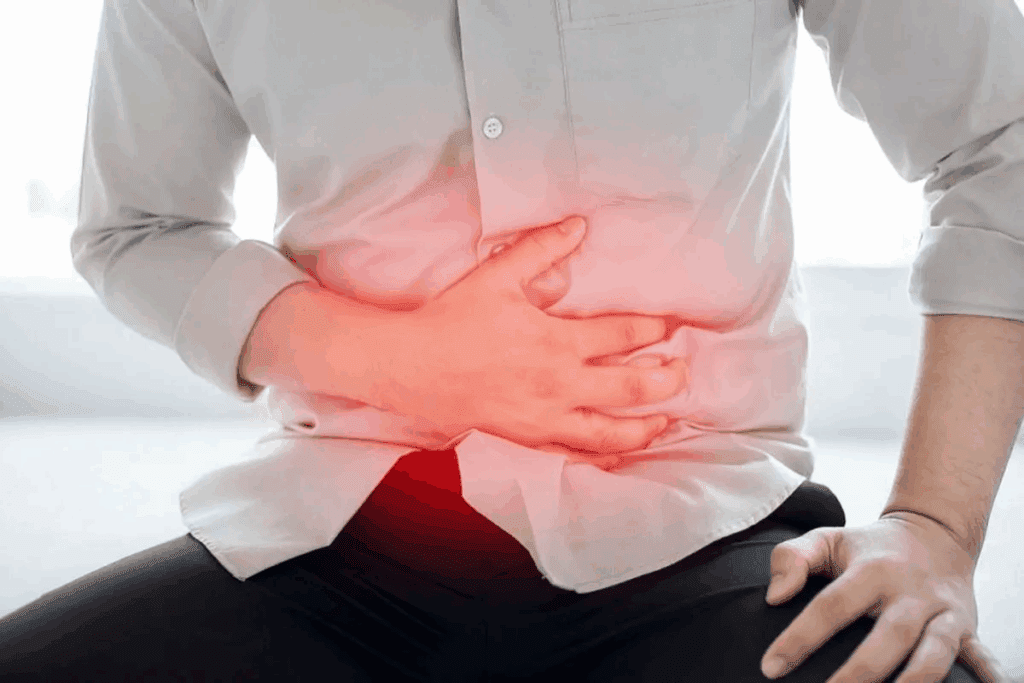Last Updated on October 31, 2025 by Batuhan Temel

We often think of chest pain when we hear about a heart attack. But what about stomach pain or cramps? Can they warn us of a serious heart problem? Yes, they can. Sometimes, heart pain can feel like it’s coming from the stomach, making it hard to tell if it’s just a tummy ache or something more serious. Discover if abdominal pain heart attack symptoms could indicate a serious cardiac event and what to do.
At Liv Hospital, we know how important it is to tell the difference between normal stomach issues and serious health problems. While chest pain from swallowed air or digestive issues is common, a heart attack can cause severe pain. It might also make you feel short of breath, nauseous, or dizzy.

Abdominal pain and heart attacks are more connected than you might think. Chest pain is the usual sign of a heart attack. But, abdominal pain can also warn of a heart attack, more so in women. We’ll look into how heart pain can show up in the stomach and why this happens.
Heart pain, usually felt in the chest, can also be felt in the abdomen. This is because of the complex nerve network between the heart and stomach. When a heart attack happens, the pain might feel like it’s coming from the stomach. Stomach cramps and discomfort can be signs of a heart attack, even more so in women, making it hard to diagnose.
A study in Medical News Today showed that up to one-third of heart attack patients feel pain in their stomach, not just their chest. This shows how important it is to watch for stomach pain as a sign of a heart attack.
Referred pain happens when pain is felt in a different place than where it started. For heart attacks, pain can go to the stomach because of shared nerves. The nerves from the heart and stomach meet in the spinal cord, leading to confusion in where the pain comes from.
The way referred pain works can vary a lot. Some people might feel very bad stomach pain during a heart attack. Others might not feel any pain in their stomach at all. Doctors need to understand this to correctly diagnose heart attacks, even when the main symptom is stomach pain.

Abdominal pain is often linked to digestive problems. But, it can also be a sign of a heart attack. A Scripps cardiologist says if you’re not sure if it’s heartburn or a heart attack, get medical help fast. This shows how vital it is to know the difference between stomach pain and heart issues.
Stomach pain from the heart feels different than usual heartburn or tummy troubles. It might feel like a dull ache or a sharp pain in the upper belly. Key characteristics include:
Telling heart-related stomach pain from common tummy troubles is hard but key for quick treatment. Here’s a table to help you see the differences:
| Symptom | Heart-Related Stomach Pain | Common Digestive Issues |
| Pain Characteristics | Dull ache or sharp stabbing | Burning, cramping, or bloating |
| Triggers | Often unrelated to food intake | Typically related to eating or digestion |
| Associated Symptoms | Shortness of breath, dizziness, nausea | Bloating, gas, changes in bowel movements |
Any unexplained belly pain is serious and might mean a heart problem. It’s important to know the signs of heart-related stomach pain and how it differs from usual tummy troubles. This way, you can get help fast when you need it.
In some cases, a heart attack can feel like a bad stomach issue. This is called the “heart attack of the stomach.” It’s tricky because the pain is mostly in the stomach, not the chest.
The “heart attack of the stomach” is when a heart attack mainly shows up as stomach pain. This is because the brain thinks the pain is coming from the stomach, not the heart. It’s a type of pain that gets misinterpreted.
At Liv Hospital, our heart doctors are experts at spotting and treating these unusual heart attack symptoms. We use top-notch tools to figure out why the stomach hurts and fix it fast.
Many studies have looked into the “heart attack of the stomach.” They found it’s more common in women and people with diabetes. For example, a study showed about 10% of heart attack patients felt stomach pain first.
Our own cases at Liv Hospital show how important it is to think of heart attacks when someone has sudden stomach pain. Quick action can really help patients get better.
Understanding the “heart attack of the stomach” helps doctors diagnose and treat heart attacks better. At Liv Hospital, we’re dedicated to top-notch heart care. We use the latest research and technology to help our patients.
Heart attack symptoms can vary between men and women. Women often have non-traditional symptoms. While both men and women may feel chest pain, women are more likely to feel stomach pain, nausea, and other unusual symptoms.
Hormonal differences, smaller coronary arteries, and pain perception may explain these gender differences. Women are more likely to have stomach cramps and heart attack symptoms. This can sometimes delay diagnosis and treatment.
“Women are more likely than men to suffer from non-chest pain symptoms, including unusual fatigue, indigestion, back pain, and shortness of breath.”
This makes diagnosing heart attacks in women harder. It’s important to understand these differences for timely treatment.
Research shows women often feel abdominal pain during a heart attack. About 40% of women report this symptom, compared to 20% of men. This highlights the need for more awareness among everyone.
| Symptom | Women (%) | Men (%) |
| Chest Pain | 70 | 85 |
| Abdominal Pain | 40 | 20 |
| Nausea/Vomiting | 50 | 30 |
The table shows men and women report symptoms differently during a heart attack. Women are more likely to feel heart attack pain in abdomen and other unusual symptoms.
It’s key for both patients and healthcare providers to understand these differences. Recognizing how heart attacks can present, like in women, helps improve diagnosis and treatment.
Abdominal pain during a heart attack is common. It’s important to know the different types. Studies show up to one-third of heart attack patients have non-chest pain symptoms, like various abdominal discomforts.
Upper abdominal pain or pressure is a common symptom. It can feel like indigestion or heartburn. This makes it hard to tell it’s a heart attack symptom.
The pain might be a dull ache or pressure. It doesn’t always get worse with movement or deep breathing.
Some people get stomach cramps or spasms during a heart attack. These can be very severe. They might be mistaken for a stomach problem, not a heart issue.
The cramps can happen often or all the time. This makes it hard to figure out what’s causing them.
Nausea and vomiting can also happen during a heart attack. They often come with other digestive problems. These symptoms can be so bad they hide other heart attack signs.
It’s key to know about these abdominal pain types during a heart attack. If you have severe or strange abdominal pain, seek help right away. This is true if you also have symptoms like shortness of breath or feeling dizzy.
Heart attack symptoms are not just chest pain. They include a wide range of signs. While chest pain is common, many people have other symptoms that are just as important.
Heart attack symptoms can differ from person to person. Symptoms like dizziness, shortness of breath, and sweating are common. These can be mistaken for other issues, leading to delayed medical care.
Stomach cramps are another symptom that can signal a heart attack. This is due to a phenomenon called referred pain. It makes the heart pain feel like it’s coming from the stomach.
“The symptom complex of heart attack includes not just chest pain but also a range of other symptoms like nausea, vomiting, and abdominal discomfort.”
Medical Expert, Cardiologist
| Symptom | Percentage of Patients |
| Chest Pain | 70% |
| Shortness of Breath | 45% |
| Nausea/Vomiting | 30% |
| Abdominal Pain | 20% |
Non-traditional symptoms are often overlooked. Symptoms like abdominal pain might seem like a stomach issue, not a heart problem. It’s key for both patients and doctors to know all possible symptoms to get timely help.
We stress that any unusual stomach pain is serious. It’s important to watch for symptoms like shortness of breath or dizziness. Recognizing these signs can help save lives by getting treatment sooner.
Abdominal pain can be a sign of a heart attack, making it hard for doctors to diagnose. Chest pain is more common, but sometimes, people only feel pain in their stomach. This makes it tricky to figure out what’s wrong.
Heart attacks with stomach pain are often mistaken for other issues. Doctors might first think of problems like gastritis or indigestion. Medical News Today says chest pain from a heart attack can feel like mild indigestion, making it even harder to diagnose.
Some groups, like women and people with diabetes, might not show typical heart attack symptoms. This can lead to delays in getting the right treatment.
Doctors are using new tools to better diagnose heart attacks. These include:
| Diagnostic Tool | Description | Benefit |
| Electrocardiogram (ECG) | Measures the electrical activity of the heart | Quickly identifies heart rhythm abnormalities |
| Troponin Blood Tests | Detects troponin proteins released into the blood during a heart attack | Highly sensitive for diagnosing myocardial infarction |
| Coronary Angiography | Imaging test that visualizes the coronary arteries | Identifies blockages in the coronary arteries |
It’s key for patients to clearly share their symptoms with doctors. They should describe the pain’s nature, how bad it is, and how long it lasts. This helps doctors decide if more tests are needed.
We stress the need for patients to know that stomach pain can be a heart attack sign. Understanding these challenges and solutions helps both doctors and patients get the right care on time.
If you have unexplained or severe abdominal pain, it’s key to know when to go to the emergency room. Abdominal pain can mean many things, from simple digestive issues to serious problems like heart attacks. Knowing when to get help fast can prevent big problems.
Some symptoms with abdominal pain are warning signs that need quick medical check-ups. These include:
These signs might mean a serious issue, like a heart attack or an abdominal aortic aneurysm. You need to get medical help right away.
If you need emergency care, here’s what to do while waiting for help:
Medical guidelines say if you’re not sure if your pain is from heartburn or a heart attack, get help right away. Remember, any unexplained abdominal pain could be a sign of a heart problem.
It’s important to know what increases the chance of having unusual heart attack symptoms. Some medical conditions, age, and medicines can change how symptoms show up. Knowing these can help spot problems early.
Some health issues can hide or look like heart attack signs. This can make it harder to get a diagnosis on time. For example:
Who you are can also affect how heart attack symptoms show up. Studies have found that:
Some medicines can change how heart attack symptoms appear or be confused with other issues. For instance:
Knowing these risk factors helps doctors spot people at risk for unusual heart attack symptoms. This way, they can act fast to help.
At Liv Hospital, we use the latest treatments for heart attacks. Our goal is to give our patients the best care. We focus on advanced heart care, from emergency help to helping patients recover and prevent future heart attacks.
Our modern treatments include emergency actions like thrombolysis and primary percutaneous coronary intervention (PCI). These steps are key to getting blood flowing to the heart again. This helps reduce damage and boosts survival chances.
Thrombolysis uses drugs to break up the blockage in the artery. It works best if done quickly, within a few hours of symptoms starting.
Primary PCI is a more direct method. It uses a catheter to open the blockage. This method is more effective and is the top choice when it can be done quickly.
Once the initial treatment is done, we focus on recovery and preventing future heart attacks. We offer cardiac rehabilitation programs. These programs are led by a team of experts, including cardiologists, nurses, and dietitians.
These programs help patients get stronger and improve their heart health. They teach patients how to live a healthier lifestyle. This includes exercise, heart-healthy tips, and stress management.
We also work on managing risk factors like high blood pressure and diabetes. We use medicines and lifestyle changes to help control these conditions.
At Liv Hospital, we aim to provide top-notch medical care. Our team helps create personalized recovery plans for each patient. We ensure they get the support they need for the best recovery.
We stress the need to take abdominal pain seriously as a heart attack sign. Knowing the signs of a heart attack, like stomach pain, is key for quick medical help. Unexplained stomach pain can warn of a heart issue, and knowing this can save lives.
The connection between stomach pain and heart attacks is complex. It’s vital to see stomach pain as more than just a minor issue. If you have ongoing or severe stomach pain, get medical help right away.
Understanding heart attack symptoms, including stomach pain, helps us act fast. This can prevent serious problems. We urge everyone to watch their health closely. If you’re worried about stomach pain or other heart attack signs, talk to a doctor.
Yes, stomach cramps can be a sign of a heart attack. Heart pain can spread to the stomach, causing discomfort or cramps.
Heart-related stomach pain often comes with other symptoms like shortness of breath or dizziness. Pain can also spread to the arm or jaw. If unsure, it’s best to see a doctor.
The “heart attack of the stomach” is when stomach pain is the main symptom of a heart attack. It shows how complex heart attack symptoms can be and why we need to be aware.
Yes, women are more likely to feel stomach pain or nausea during a heart attack, research shows.
During a heart attack, people often feel upper abdominal discomfort, stomach cramps, or digestive issues.
Symptoms like abdominal pain are often missed because they don’t fit the usual heart attack profile. But, it’s key to recognize all symptoms for timely care.
Diagnosing heart attacks with abdominal pain is tough because it looks like digestive issues. Advanced tests and clear communication are vital.
Seek emergency care for severe pain, trouble breathing, or dizziness. Or if you’re not sure what’s causing your symptoms.
Certain medical conditions, demographics, and some medications can raise the risk of atypical symptoms. These can mask or change how symptoms appear.
Modern treatments include emergency procedures like angioplasty and thrombolysis. There are also recovery and prevention strategies to lower future risks.
Yes, abdominal pain can signal a heart attack, even without a heart disease history. It’s important to take unexplained pain seriously and get medical help.
Subscribe to our e-newsletter to stay informed about the latest innovations in the world of health and exclusive offers!
WhatsApp us